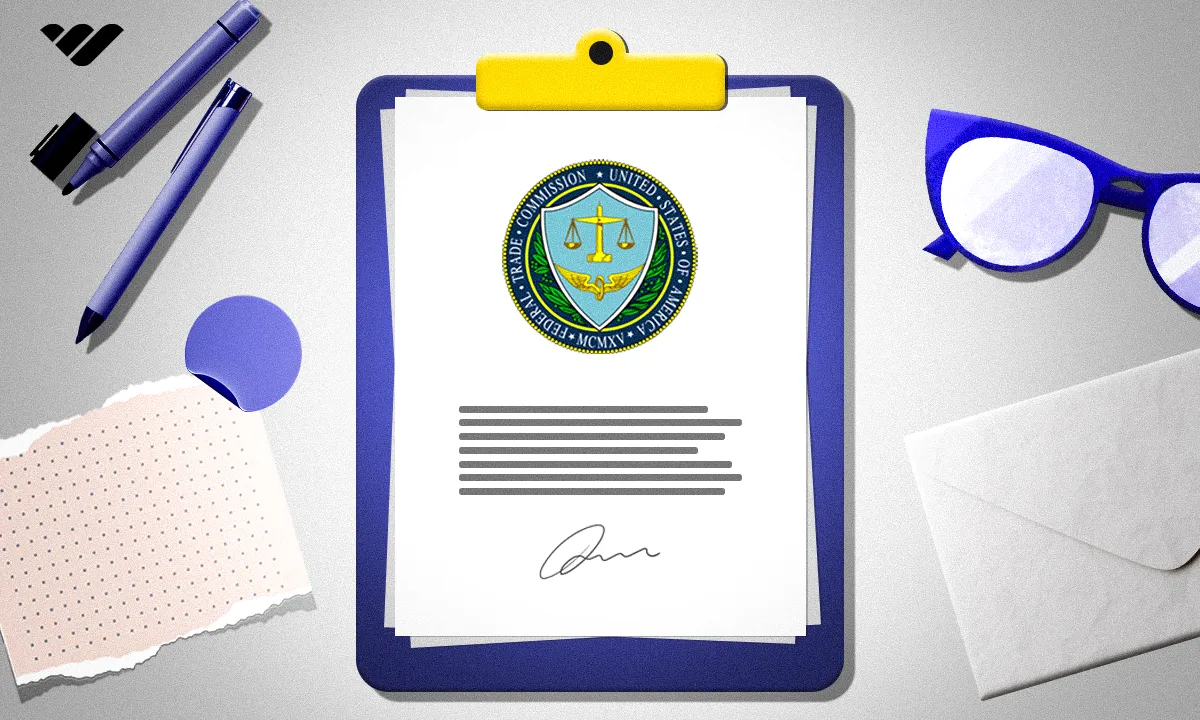The FTC (Federal Trade Commission) has strict rules and guidelines about what businesses can and can't do. Read this guide to understand what that means for you.
Key takeaways
- Online businesses must follow the same FTC advertising and disclosure rules as traditional brick-and-mortar companies.
- Product endorsements and testimonials must reflect typical customer experiences, and influencer relationships must be clearly disclosed with tags like #ad.
- Violating FTC rules can result in significant fines, legal action, and lasting damage to your business reputation.
When you own a whop, you also own an online business, and with this great power comes great responsibility.
Following the law is a big part of running a successful business, so it's a good thing that you're here. The trouble with figuring out what you need to do is that these things are often quite hard to read.
If you’ve ever visited a .gov website and read some of the content, you might have noticed—that stuff gets seriously complicated. It’s hard to understand which parts are relevant to you or what they even want you to do.
I feel you—as a business owner myself, I've been there, and I want to save you the hassle and the time spent scratching your head in confusion.
That’s where this guide comes in. Below, I'll break down all the FTC rules and guidelines that are important for you as a Whop creator. Bookmark this—it's bound to come in handy!
What is the FTC?
The FTC (Federal Trade Commission) is a part of the American government that protects consumers from unfair business practices. It tries to make sure companies can’t do things like refuse refunds, say misleading things about their products, or try to make people pay hidden fees they didn’t agree to.
In 2017, it refunded more than $269 million to consumers who had been affected by unfair business practices. As well as making rules and laws that businesses have to follow, it also teaches people how to spot scams and suspicious business claims.
Now that there are so many people running small and medium businesses online, the FTC also puts out lots of resources to teach business owners how to work within the law and avoid getting in trouble.
The FTC has a lot of rules, however, and many of them are only relevant in certain situations. That’s why I’ve put together this guide to show you which rules are actually important when you're running your business on Whop.
Why do I need to follow FTC rules and guidelines?
Any consumer can send a report to the FTC, so if you end up breaking rules, the FTC could find out about it at any time from one of your customers. When this happens, the FTC usually files a complaint against the offender and makes them pay a fine.
In extreme cases, the FTC can also call on their partners like the U.S. Department of Justice to bring criminal charges against the offender.
For example, during the pandemic, an online store called SuperGoodDeals got in trouble for promising people next-day delivery on facemasks and other virus-related equipment. The business was taken to court and had to pay more than $145,000 to the FTC to cover refunds, and they were banned from selling personal protective equipment (PPE) in the future.
In another example, a tax preparation company called H&R Block committed a few different offences such as claiming some of their products were free when they weren’t and making it difficult for customers to downgrade or cancel products. The settlement the FTC has proposed would make the company pay $7 million to compensate affected consumers.
There are thousands more examples of cases the FTC has brought against businesses that break their rules. Rather than dealing with the FTC or the U.S. Department of Justice, it’s much easier and safer to just research the rules and stick to them.
Key FTC rules and guidelines to be aware of
Just because your business is online doesn’t mean you’re exempt from the rules. The FTC has a number of guidelines for digital businesses like Whop that make sure everything is transparent and fair.
Here are the most important rules you need to know.
1. Advertising and marketing

One of the most important responsibilities you have as a business owner is making sure you advertise your product truthfully and accurately.
It might seem obvious in some ways, but, as an example, you can’t sell a bottle of orange juice and claim that it will make anyone who drinks it grow 10 inches taller. That's just not true, and the FTC doesn't approve of that.
Truth in advertising
When you’re advertising your product, you have to be very careful about what you say.
Here are some simple rules to think about:
- If you know it’s not true, don’t say it.
- If you’re not sure, you have to do research to decide whether it’s true or not.
- Don’t phrase things in misleading ways. Even if you’re not technically lying, you’re still breaking the rules.
- If you make a claim about something, you need to be accurate and transparent and make sure you have evidence.
Making claims can get pretty complicated because it always takes time and effort to keep things FTC-compliant. For example, you can’t use the phrase "50% of customers" unless the information you have is based on every single one of your customers.
If you just ran a survey and some customers answered, you have to be transparent about that. If you used software to collect the information but some customers didn’t give you permission, you need to be transparent about that as well.
Endorsements and testimonials
Endorsements are a huge part of advertising, whether they come from consumers, celebrities, or experts—but you can’t just pay people to say whatever you want.
If you’re going to include an endorsement when you advertise your product, you need to make sure you’re following these rules:
- Endorsements by consumers have to reflect the typical experience of using your product. That means the "average" good experience, not the best experience possible.
- Endorsements by celebrities or influencers must be honest, and they have to be based on actual experience. You can’t just pay them to say a few pre-written lines; they have to genuinely use your product and form an opinion.
- To call something an "expert endorsement," the person has to have proper qualifications. They must also use the product, conduct proper evaluations of it, and record all the information as evidence.
- You have to publish information on your relationship with the endorser and whether you paid them for the endorsement.
Online reviews
Online reviews about your product will appear in multiple places, such as your own website, your whop store page, on Google, and on various third-party websites. Different places have different rules, so make sure to do your research.
Here are some general things to think about:
- Don’t ask for reviews from people who haven’t used your product.
- Ask for reviews from all customers, not just the ones you think will write positive things.
- Don’t ask family, friends, or employees for reviews.
- If you offer a reward or incentive for leaving reviews, you have to offer it no matter what the review content is.
- When a review is incentivized, you have to mention this in the review.
Some review sites will allow you to post reviews written by family, friends, or employees as long as their connection is disclosed, but you need to check the site’s rules first.
It’s also possible to buy reviews in bulk, which end up written by bots or random people who don’t even know what your product is. This is very against FTC rules, and you should make sure you never do this.
It’s also against the rules to try and hide, delete, or discourage negative reviews. You shouldn’t spam a site with fake reviews to push negative ones down the list or flag a review as fake if it isn’t.
When you get a negative review, the best thing you can do is reply to it and try to resolve the customer’s problem. That way people who see the bad review will also see that you do your best to resolve issues, which is an important part of creating a great customer experience.
2. Disclosures

"Disclosures" are all about being open and providing consumers with relevant information. You always have to give people the full story, otherwise it can lead to misunderstandings that the FTC will consider you responsible for.
Dot-com disclosures
Dot-com or .com disclosures just refer to anything you need to disclose while running your online business. The most important thing to remember here is that the same laws that apply to normal businesses apply to your online business, too.
When you disclose relevant information, you can’t always just put an asterisk and add the information in small print somewhere else. When it’s practical, you need to try and incorporate it right into your advertising.
For example, if you want to make a claim based on a customer survey you did, it would be practical to use the phrase "50% of surveyed customers" instead of just "50% of customers."
It’s practical because it only adds one more word and doesn’t really affect the length or impact of your ad.
If you tried to asterisk this information and put it at the bottom of the webpage, the FTC could argue that you were trying to make that information harder to access for no good reason.
Influencer disclosures
Influencer marketing is a great way to advertise but when it was new, there weren’t any rules yet and people could pretty much do whatever they wanted. That isn’t the case anymore.
The FTC has a section dedicated to disclosures for social media influencers, and these are the parts you need to remember:
- You must tell your customers whenever you have a financial, employment, personal, or family relationship with an influencer.
- Remember that a financial relationship doesn’t just mean money; giving them products for free also counts.
- Making specific content isn’t the only way a social media influencer can endorse your business. Likes, pins, reposts, tags, and other interactions can count too.
- When you disclose your relationship with a social media influencer, you have to make it hard to miss. It can’t disappear after one second or be so small that some people won’t see it—it has to be obvious.
- Make sure the disclosure is visible no matter where the consumer views the content. This includes mobile devices like phones and tablets.
- You shouldn’t use a set phrase or start using fancy words when you disclose. Plain language is always better. The influencer can just say something like "Thanks to X for sending me this free product" and use tags like #ad or #sponsored.
- Remember it’s your responsibility to make sure the relationship is disclosed by both your business and the influencer, and that it is included in all the content they make for you.
- And again: Remember that the influencer has to actually try your product! Never get someone to talk about a product they’ve never used. Aside from FTC guidelines, your customers will appreciate hands-on reviews more than just a bunch of generic comments.
3. Data privacy and security
If your whop is aimed at parents or children, you need to be a bit more careful about advertising and data collection.
The easiest thing to do is to not collect any data about children, and also make sure you disclose your privacy policy. When you’re making your own ads for your business, make sure to stick to all the normal rules.
If you run third-party ads on your website or app or any other part of your product, you need to make sure they are child-friendly. Many advertising services won’t let you control the ads they show, so you need to choose a service that puts you in control.
If you show ads that aren’t child-friendly, the FTC will always hold you responsible, not the ad service you use.
4. Billing practices

Making sure your billing practices are proper and lawful is actually pretty easy. All you have to do is make sure your customers always know exactly what they are buying and what payments they are agreeing to.
More specifically, follow these rules:
- Make it clear when a customer is buying a subscription, agreeing to an auto-renewal, or starting a free trial that will change into a paid plan.
- One good way to make things clear is to tell the customer what they are going to pay now, when their next payments will be, and how much they will cost.
- Never try to hide additional payments from a customer. They should always know exactly what they’re buying and paying for.
- Always disclose the terms of purchase and get the customer to consent before billing. Whop takes care of this for you, so you just need to make sure the rest of your messaging aligns with the terms and conditions!
- Never share a customer’s billing information with a third-party merchant. Anyone who wants to take a payment from a customer has to obtain the payment details directly from the customer.
- If you offer add-ons or additional services from third-party sellers, make it clear that these services are a separate transaction and not included in the transaction the customer is making with you now.
5. Anti-spam regulations
If you use email marketing (which is any email you send to advertise or promote your products) there are rules you need to follow.
Worth noting: The CAN-SPAM Act, which is enforced by the FTC, counts every rule-breaking email as a separate offense.
That means, if you send your customers 100 different emails that all break the rules in one way or another, you’d have to pay 100 fines! The fines can go up to $51,744 so it can be very expensive to break these rules.
As always, it’s much easier and less of a bother to just follow the law. Here’s what you need to do:
- Always use accurate header information—this means the email needs to show who it’s being sent to and who sent it. Don’t try to make a customer think the email is from someone else other than your business.
- The subject line has to be related to the content of the email. You can’t use a subject line like "Massive 50%-off sale!" if your email isn’t about a 50%-off sale.
- You have to disclose the email as an advertisement. A common way to do this is to just start your subject line with "Ad:" but there are lots of other ways, too.
- You have to tell people where you are by including your business’ physical address.
- Tell your recipients how to opt out of future marketing emails. People usually do this by including a link at the bottom of the email saying something like "Unsubscribe here."
- Remember that everyone has the right to opt-out, so always include the option in every single email, no matter what kind of customer you’re sending it to.
- Even if you hire another company to take care of your email marketing, you are the one the FTC will hold responsible if your emails break the rules. Always make sure you know what other companies are doing on your behalf.
6. Deceptive practices

A deceptive practice is when you try to mislead customers so they misunderstand what they are agreeing to. When the FTC investigates something like this, they look at the language you use and decide whether it was your fault that the customer misunderstood.
Here are some common examples of deceptive practices that you should avoid:
Fake scarcity tactics
This is when you pretend that something is about to run out when it isn’t. For example, saying "only three left in stock!" when you actually have thousands, or saying there’s only three tickets left to your event or three spaces left in your community.
A simple rule here is that if it’s not true, you shouldn't say it.
Hidden fees
The full price of a product should always be on the product page. You can’t make additional fees appear at the checkout without explaining what they are or giving the customer a chance to agree or not agree to them.
If the price of your product is made up of multiple parts, you should say so. For instance, a cupboard might cost $100 plus shipping fees, or an online course might cost $40 plus subscription fees.
Bait-and-switch
This refers to a tactic where companies advertise a product at a low price but when the customer tries to buy it, it’s unavailable. Instead, the company pressures the customer to buy a similar but more expensive product instead.
Another version is when the original product isn’t available but the seller offers a lower-quality item for the same price.
7. Ecommerce specifics
When you’re participating in ecommerce, there are three big things you need to make sure you do correctly. These are refunds and returns, product delivery promises, and pricing transparency. Let’s have a look at each one.
Consumer refunds and returns
As a whop owner, this is super easy. Whenever one of your customers has a problem, they can open a claim through Whop’s Resolution Center. All you have to do is respond when you get a notification about a claim.
You can accept the case, deny the case, or ask for more information from the user. You can also upload evidence if needed.
If you and the user can’t come to an agreement, the Whop team will step in to take a look at the situation and make a fair decision.
Product delivery promises
If you offer a product or service and a customer buys it, you must deliver those products and services.
If something goes wrong and you can’t give the customer what they paid for, you need to let them know as soon as possible and give them a choice between waiting for you to resolve the issue or canceling their purchase and receiving a refund.
These rules apply to every digital product or service you offer on Whop, even though you’re not sending physical items to your customers. For example, if your customer buys a membership that comes with one live call with you every week, you need to deliver that service.
If you failed to turn up for the call and didn’t reschedule, the customer would have grounds to open a claim in the Resolution Center.
Pricing transparency
As the owner of a whop, you can decide how much to charge for your products and services. However, you have to present the price transparently.
For example, if your product costs $49.99, you can’t present the price like this:
$74.99 $49.99
This is a false discount, based on an inflated price that doesn’t actually exist. Because your product doesn’t actually cost $74.99, you’re misleading customers into thinking they need to make a purchase quickly to get a better deal or misleading them into thinking your product is more valuable than it really is.
8. Fair competition

There are also some antitrust laws you should keep an eye on as a whop owner.
Antitrust is all about promoting economic competition, because when companies are competing with each other, it leads to more innovation and better deals for us all.
Here’s the main thing you need to avoid.
Price fixing
Whops are super unique but there are still multiple whops offering similar kinds of services. For example, there are several influencers offering courses and coaching on how to make money with social media.
According to antitrust laws, every one of these whops has to make its own decisions about pricing. Price fixing is the opposite of this—when multiple business owners decide on a fixed or minimum price that they will all stick to.
If every whop sold its social media course for at least $5,000, consumers would have no choice but to pay that amount. Another name for this tactic is "collusion."
9. Emerging areas
When it comes to laws and regulations, things move pretty slowly. So even though it feels like ecommerce and social media have been around for a while, it can take a while for government guidelines to catch up.
With super new stuff like AI, it will probably take ages for best practices to get standardized. Because everything is constantly changing and getting updated, it’s important for you to stay on top of the latest rules.
Of course, our team at Whop will help you out by making new documentation and blog posts when something big happens, but it’s important to do your own research, too.
Influencers and social media marketing
Social media sites like Instagram and TikTok are constantly coming up with new ways for influencers and brands to partner together and promote products. With every new promotion method that appears, FTC advice will follow (at some point!).
You can check this page on FTC’s endorsement guides for new information on this kind of thing. It answers lots of specific questions people are asking about social media and different kinds of endorsements, so if you’re looking for something specific, try typing in some keywords to search the page and see if your question has been answered.
AI and automated decision-making
For now, if your whop uses artificial intelligence in one way or another, the best and most important thing to do is make that clear. Just let your customers know when AI is being used, and that will go a long way to making sure that you don’t break any rules.
More specifically, it’s also a good idea to make sure the AI you use is actually producing the results you want.
If you’re letting AI make decisions, anything can happen, and you need to make sure the results are transparent, fair, and unbiased, just the same as if you were the one making the decision.
How to keep on top of FTC rules and guidelines
When you own a business, it’s always your responsibility to make sure it's FTC-compliant. This does require time and effort, but remember—it will always cost more time and effort if you’re caught accidentally breaking the rules!
Here are three simple tips to make sure you're always staying on top of things.
Stay up to date
Favorite this post and the FTC website and make sure to check back for updates and clarification if you’re ever unsure about something.
Staying informed is the only way to stay compliant, so make a recurring event in your calendar if you think you’ll forget to check every few months.
Conduct internal audits
Whether you’re a one-person business or you have employees, it’s always important to run checks on how your business is doing things.
Every so often, check out your recent marketing emails, data collection trends, and sales practices to make sure they’re just as compliant as when you last looked.
Remember, you’re responsible for what third-party companies do on your behalf too, so you also need to check their work and how they do things.
Provide training
If you do have employees or people who help you out, make sure they are properly trained on consumer protection laws. As always, you’re the one that the FTC will hold responsible if something goes wrong—you can’t just blame your employees!
Got questions? Let's talk

This kind of stuff can get a little complicated, but our team is here to support your business however we can.
Don’t worry, though. Thousands of creators like you make a living the way they want to, and you can do it too as long as you spend a little time checking that you’re in the clear.
If you need any help figuring out what to do in a specific situation or you need some more information on FTC guidelines, just hit us up at the Whop’s Help Center. We’ll help you make sense of it all and get back to what matters most, which is running your business.


